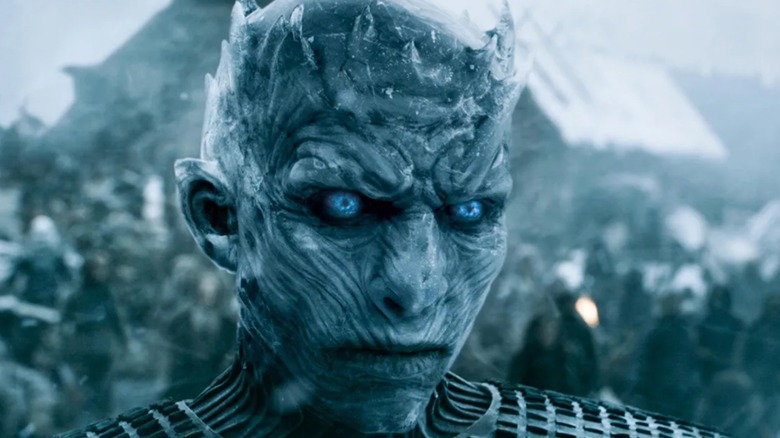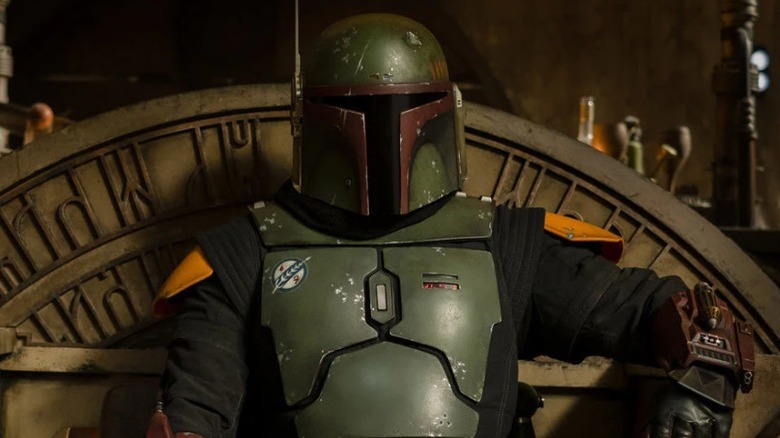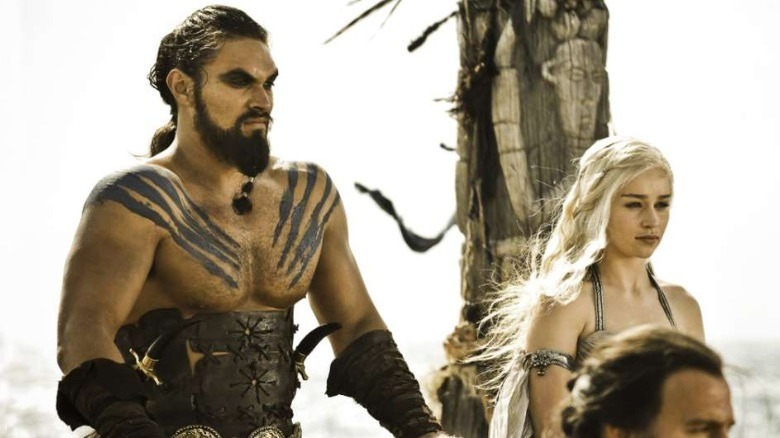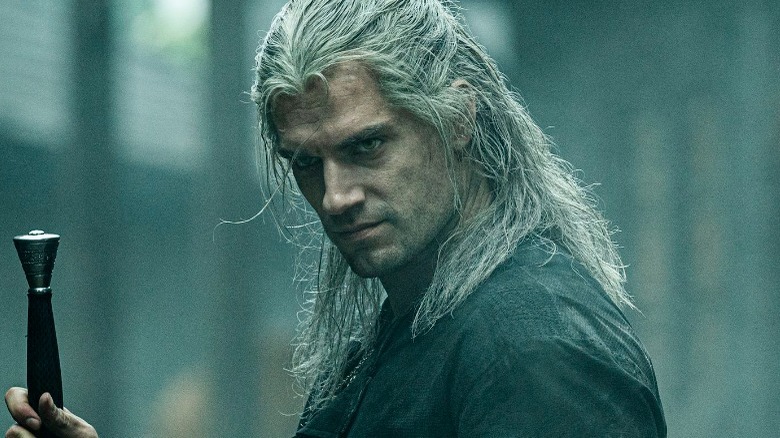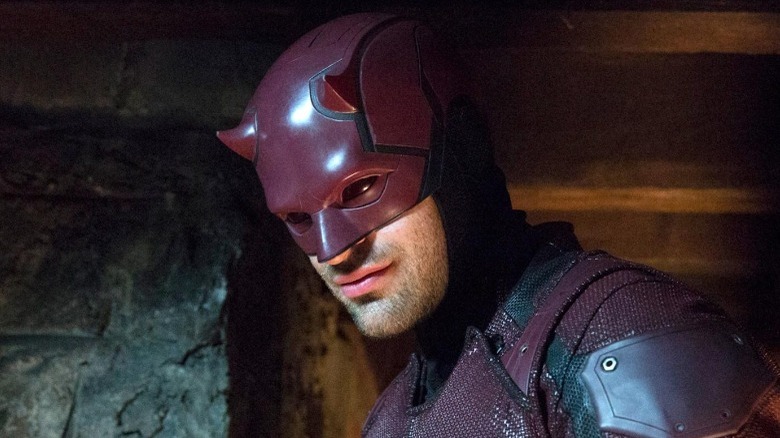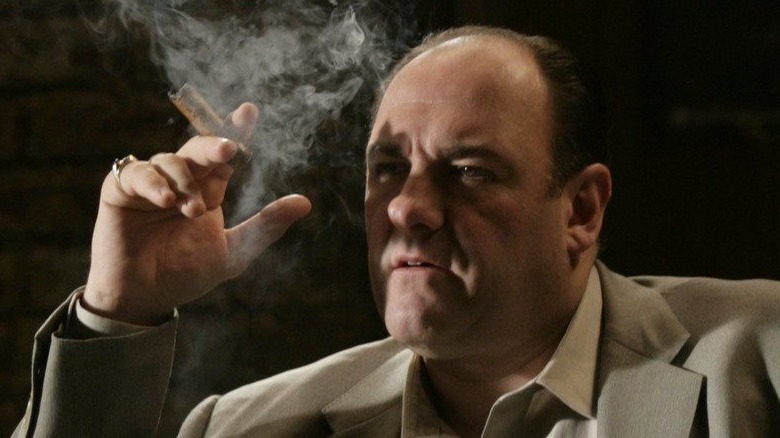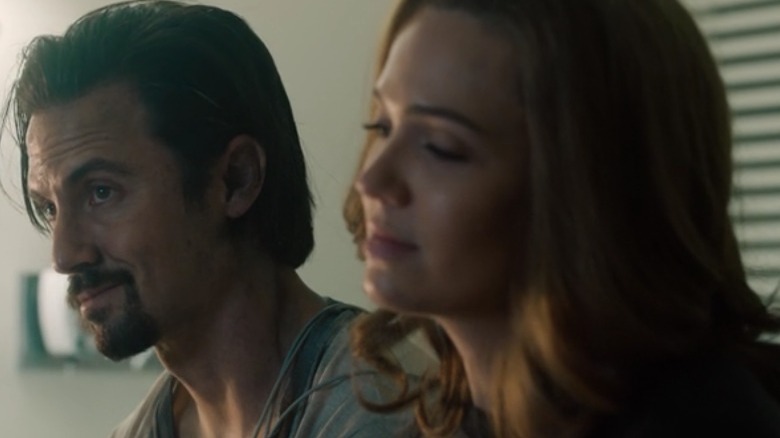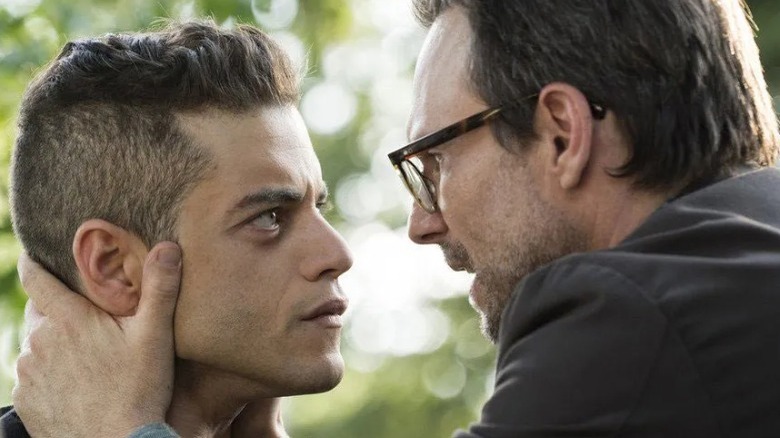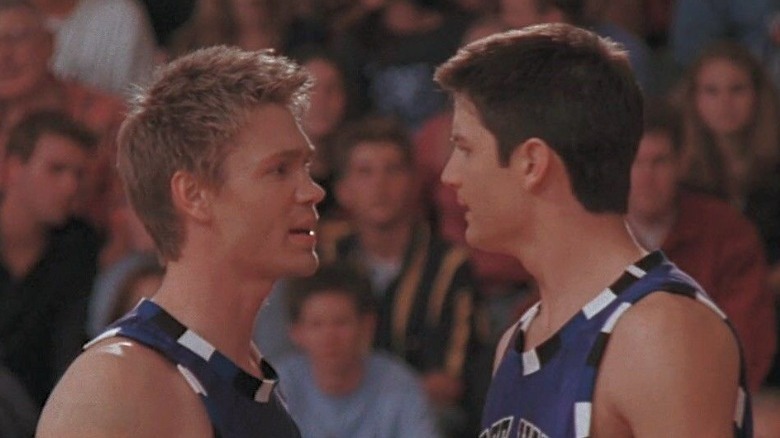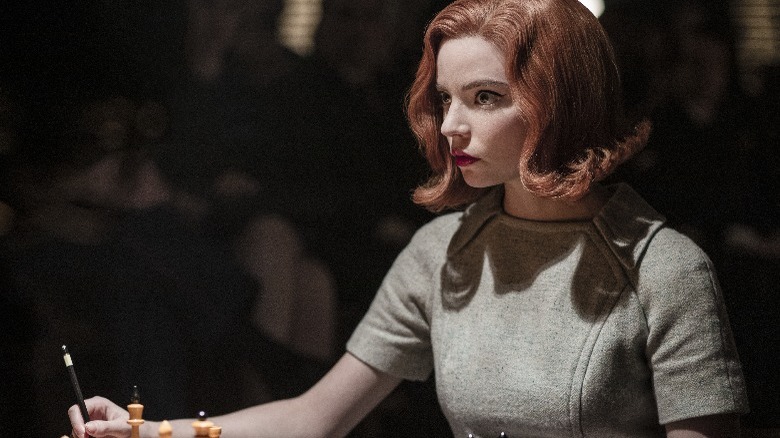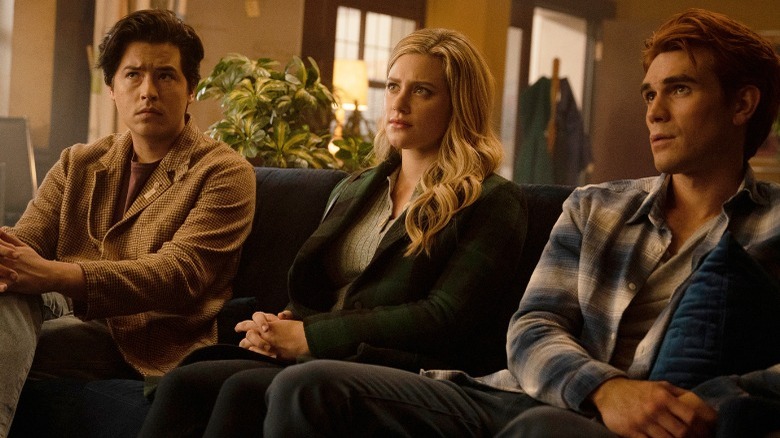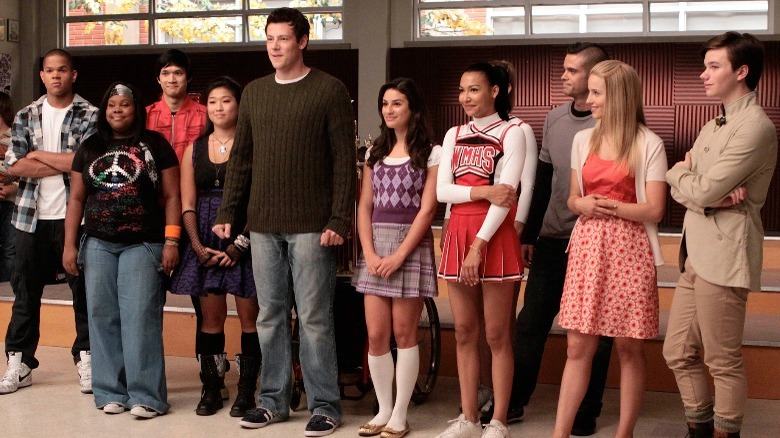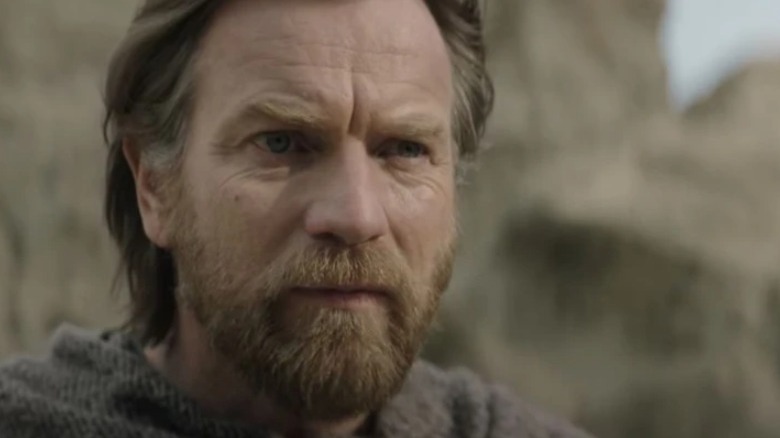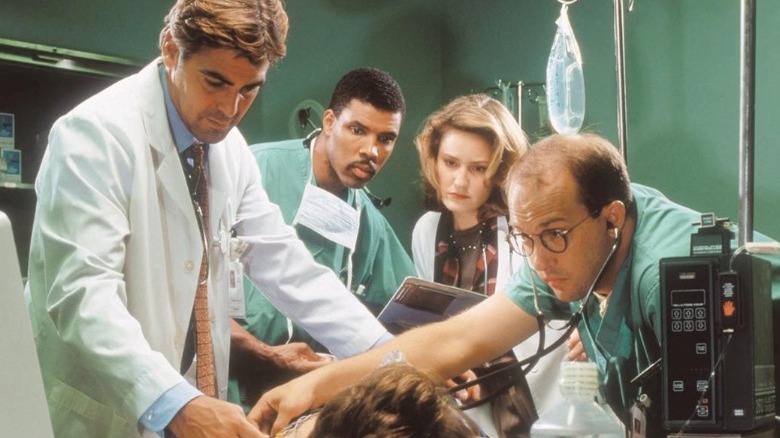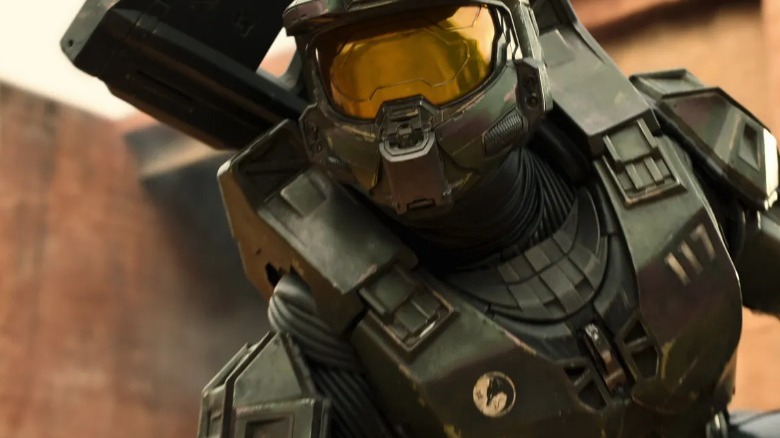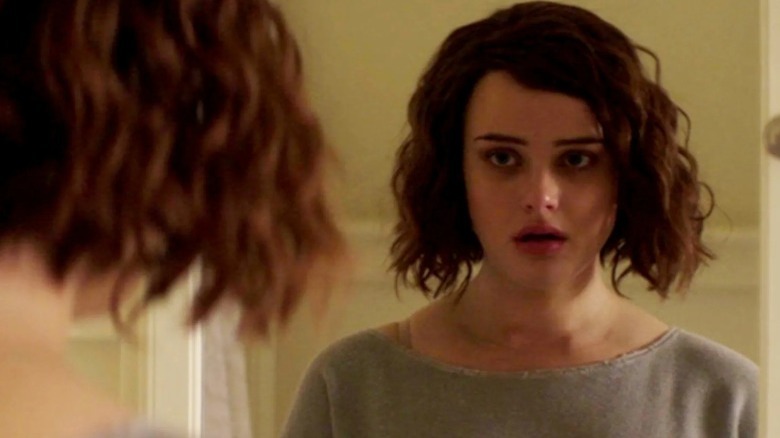TV Series That Were Originally Planned As Only A Movie
Despite its contributions to culture, television was once regarded as inferior to the silver screen. That began to change with the dawn of the second Golden Age of TV, which began in the 2000s and saw series take on cinematic qualities (and budgets). Since the advent of streaming, the movie industry—from mega-blockbusters to animated features—has increasingly overlapped with its small-screen cousin. Some TV series have been known to receive movie sequels, like the spine-tingling series "The X-Files." On the flip side, some film franchises have seen a continuance in the form of a TV series like "Taken" or "Buffy the Vampire Slayer." However, in rare occurrences, projects are initially conceived as feature-length films, but are then turned into a television series instead. Let's take a look at some of the best projects that met this fate.
The Book of Boba Fett
The gun-slinging bounty hunter from a galaxy far, far away had a tumultuous journey before finally landing on the Disney streaming service. Shortly after Disney acquired Lucasfilm and, by extension, the "Star Wars" franchise, the company announced spin-off films telling stories adjacent to the traditional "Star Wars" saga. Boba Fett became one of those initially touted projects. Originally, Josh Trank, the director of "Chronicle" and the catastrophic box-office bomb that was 2015's "Fantastic Four," pitched his version of a Boba Fett narrative to Lucasfilm. The studio was enthusiastic about his ideas and announced his admission to the "Star Wars" family, as he was to direct the Boba Fett standalone production. After the failure and drama that spun out of "Fantastic Four," Trank quit the project understanding that he'd likely be fired if he didn't do so.
Eventually, the project landed in the hands of "Logan" director James Mangold. However, the most famous fictional smuggler seemingly ruined plans for the silver-screen future of Boba Fett. The prequel film "Solo: A Star Wars Story," which chronicled Han Solo's younger days picking fights with gangsters and the Empire, was considered a financial disappointment upon its release. Later that year, Disney seemingly torpedoed all spin-off projects indefinitely, like they were a strangely destructive design flaw in a looming space station. The focus shifted toward the new Disney streaming service, where "The Mandalorian"—in which Boba Fett makes an appearance—became a flagship series for the service's debut. Thanks to that show's success, plans for Boba Fett's own series quickly followed, and the rest is history.
Game of Thrones
George R. R. Martin's "A Song of Ice and Fire" novels are now as well-known as Tolkien's Middle Earth fantasy thanks to the additional popularity that the HBO series "Game of Thrones" brought to the books. For years, Martin had been courted by scriptwriters who eagerly wanted to share their version of Martin's neo-medieval fantasy in live-action cinema. Like a King's Landing not fit for the Dragon Queen's world, he scorched these ideas to ash and cinder. According to an Entertainment Weekly in 2011, Martin claimed that his book series was simply "unfilmable" despite visions to the contrary attempting to sell him on the idea. The author stated, "even Tolkien took three feature films, and three Tolkien [novels] are as long as one of my books." Martin also noted that, after giving a feature-film idea some thought, he felt his works were simply too "adult." As most know, intimacy and violence saturate the entire narrative.
Eventually, David Benioff and Dan Weiss approached Martin and proposed adapting his books into a series. Since the show would land on HBO, the mature content was no longer a problem. Furthermore, Benioff and Weiss could take all the time they needed to build out the story over several seasons, depending on the show's popularity. After reaching an accord with Martin on the direction of the series, film ideas were finally put to rest.
The Witcher
The White Wolf, better known as Geralt of Rivia, has long been a mainstay of the fantasy genre. Andrzej Sapkowski created the fabled Witcher and authored a collection of stories surrounding his exploits before writing a sprawling saga. The Witcher, known for his combat prowess, keen senses, and hunting acuity, is capable of slaying the most dangerous of monsters in the wilds. Geralt is also often embroiled in the warring politics, evil machinations, and drama of the most prominent characters to populate the land.
Netflix was always a prime destination for the Witcher to receive a proper live-action outing. Although the character appeared in a few well-received video games made by Polish game developer CD Projekt RED, fans were chomping at the bit to see Geralt realized in cinematic glory. "The Witcher" was originally going to receive a standalone Netflix film. However, creatives behind the scenes convinced the producers that there was far too much material to cover in the typical 90-minute runtime. They were eventually convinced that the property deserved more. They got the green light to move forward with a Netflix original series. Just think: With a different team behind the production of a feature-length movie, there's an alternate reality where we never had Jaskier's tune "Toss a Coin to Your Witcher" endlessly stuck in our heads.
Daredevil
Sure, the fiery vigilante of Hell's Kitchen already received a big-screen adaptation in 2003 with Ben Affleck taking on the role of the blind lawyer Matt Murdock. However, the Netflix "Daredevil" series was also originally envisioned and pitched as a film by series creator Drew Goddard. Goddard explained why the film approach ultimately didn't pan out in an interview with IGN. Marvel nixed the idea, believing that Goddard's approach was far too dark and violent. Marvel simply wouldn't do an R-rated film. Furthermore, Daredevil is typically seen as a local hero, interested primarily in cleaning the streets of his own neighborhood, but Marvel only invests in the world-threatening, expensive-to-make epics that the studio is known for. A smaller-scale film simply wouldn't fit the bill.
Instead, "Daredevil" landed on Netflix. Goddard was granted the freedom to produce the far more mature take he had envisioned as a series. The content was important to Goddard, who claimed that anything short of the adult nature that he aimed for in the series would have been a "watered-down version."
The Sopranos
Believe it or not, one of the most critically acclaimed cable television shows of all time, "The Sopranos," was originally destined for the big screen. Imagine seeing the larger-than-life personality actor James Gandolfini gave his character, the erratic mob boss Tony, on the silver screen. It would have been a sight to behold, though wouldn't have gotten the cultural landmark that "The Sopranos" series has become in a serial format.
According to series co-creator David Chase, the show was conceived as a film and pitched as such from the get-go. The central focus still would have been Tony Soprano, of course. Chase stated that the film was about "a mobster in therapy having problems with his mother, who's also involved in some sort of a gang war or mob business problem." Eventually, Chase's manager at the time, Lloyd Braun, suggested that his idea could actually be a television series.
Chase gave it some thought and began to wrap his mind around the mobster's life as an ongoing series. The scope of his pitch changed, but only enough to cover Season 1, ending with Tony confronting his mother over trying to kill him. Chase understood this moment as the end of their tormented relationship. The second season had to work with fresh ideas beyond Chase's plan. Of course, in the end, the creator succeeded in producing one of the best TV dramas in history.
This Is Us
The winding family drama "This Is Us" toys with viewers' emotions. The story follows the Pearson clan and their three children, who are depicted at various ages, but primarily as adults. They experience many of life's greatest joys and heartaches. After all, the Pearsons and many other supporting characters reflect many facets of American society.
While the series has proved to be one of the most successful dramas in modern television, it wasn't always meant to be the same family and production that we know today. In an interview with Emmy magazine, series creator Dan Fogelman revealed some juicy details regarding the origins of the show. Instead of Randall, Kate, and Kevin as the "Big Three," Fogelman originally penned an 80-page film production of a Pearson family with octuplets.
Ultimately, Fogelman decided that he didn't want to follow a traditional narrative trajectory of a beginning, middle, and end. He wanted to explore a lasting story that continuously unfolded in the past, present, and future of a single family. The character-driven nature of the show has proved successful, engaging audiences and critics alike. Let's just thank our lucky stars that we didn't have to follow the chaotic lives of octuplets.
Mr. Robot
"Mr. Robot" introduced hacktivists to the mainstream. These clandestine keyboard sleuths cyber-attack perceived oppressors. The series centers around Rami Malek's character, Elliot Alderson. A recluse with social anxiety and other mental troubles, Elliot works for the cybersecurity company Allsafe. Of course, he becomes something of a revolutionary after joining a hacker group led by the enigmatic Mr. Robot. The show received high praise from both critics and audiences. However, many likely don't realize that "Mr. Robot" was originally intended to be an independently produced feature film.
In an interview with Forbes, series creator Sam Esmail discussed his creative journey. Esmail stated, "When I saw it as a movie[,] I knew where I was going. I knew the ending." The problem was that he simply had more meat on the bones than was sustainable for a movie. Esmail continued, "When I got to page 90 and I was still halfway through Act 1[,] that's when I decided, 'OK. This can be a television show.'" The show creator still tackled the series like a movie production, treating each episode as a short film. Ultimately, Esmail still achieved what he set out to do with the narrative he'd originally planned.
One Tree Hill
After "Dawson's Creek," angsty teen dramas proliferated. The WB (now the CW) became a continual source for the genre. "One Tree Hill" was one such enduringly popular series, with a lengthy nine-season life. While the series starts by focusing on two half-brothers, Lucas and Nathan Scott, it eventually branches out to add the stories and drama of a whole host of other characters, from the boys' peers at school to adults in the fictional town of Tree Hill. The series is saturated with secrets, lies, romance, and even occasional violence as catalysts for drama.
Series creator Mark Schwahn envisioned a movie with his original writings. The show's high school basketball team, the Ravens, is a fixture early in the series, and the film would have taken the team's name as its title. The producers with whom Schwahn initially shared his film pitch enjoyed what he'd written, but ultimately felt the characters deserved far more screen time. They convinced Schwahn to pivot from a film production to a TV series that enjoyed strong viewership.
The Queen's Gambit
In 2020, "The Queen's Gambit" took the streaming world by storm with a thrilling period piece based on the 1983 Walter Tevis novel. The Netflix miniseries centers around Beth Harmon, portrayed by Anya Taylor-Joy. As an orphaned youth, she quickly becomes obsessed with and shows a talent for chess. She eventually develops a drug addiction to help her focus on her game and cope with personal loss. The series chronicles her rise to fame in the chess world.
"The Queen's Gambit" has long been examined for a possible feature film adaptation. In fact, the late actor Heath Ledger, himself something of a chess connoisseur, was about to make his directorial debut with an adaptation of the novel before he tragically passed away. The project was halted upon Ledger's death and was eventually brought to Netflix as a miniseries.
Riverdale
Fans of the original Archie Comics likely never suspected that a live-action adaptation would one day be in the works. The television series on the CW network, titled "Riverdale," features the exploits of the famous Archie Comics teenagers, including Archie Andrews, Betty Cooper, Jughead Jones, and Veronica Lodge. Positioned as a teen drama, "Riverdale" goes big on its mystery themes and has enjoyed a lasting legacy on the CW network with its deliciously dark tones.
Of course, Archie almost found his redhead on the big screen. Warner Bros. sought an adaptation of the character on film. The creatives behind the TV series originally had their idea dismissed and were asked to work on Archie's first-ever live-action appearance as a time-traveling story featuring Louis C.K. The studio once pictured a Riverdale with portals that would open up to other dimensions. This sounds a little too wacky, kind of like "Rick and Morty." Thankfully, "Riverdale" show creator Robert Aguirre-Sacasa didn't like that idea. He walked away from the whole ordeal only to be contacted later by the studio to commit his original vision to television.
Glee
The musically minded high school drama "Glee" burst onto the scene in 2009 and became a sensation. The series revolves around a group of outcasts who find camaraderie by expanding their musical talents in Glee Club. Part of the draw of the show is its superbly crafted musical numbers and choreographed routines. Each episode brought another popular song front and center, giving viewers something to tap their feet to or sing along with.
The idea was conceived by Ian Brennan, who was inspired by his experiences with his own high school choir in the mid-1990s. Early on, he wrote a film script. He hadn't had much experience writing screenplays, so he purchased "Screenwriting for Dummies" to help get things moving. Even though he completed the film script in 2005, it didn't find its way in front of the famous television producer Ryan Murphy until a few years later. Murphy then came back to Brennan with the idea of redeveloping the content into a television series instead of a feature film. The show found an audience fast and quickly rose to the top.
Obi-Wan Kenobi
Like the bounty-hunting Boba Fett, Jedi Master extraordinaire Obi-Wan Kenobi was once set to return to the big screen in his own solo film. Speaking of "solo," however, it was that scruffy-looking nerf herder that ruined the spin-off movie landscape for planned projects once destined to follow. "Solo: A Star Wars Story" didn't exactly gain the financial returns Lucasfilm and, by extension, Disney was looking for. They deemed the film a disappointment and shifted focus.
The Disney streaming service debuted with "The Mandalorian" and has now added "The Book of Boba Fett" to its "Star Wars" originals catalog. The streaming service obviously changed the game for Lucasfilm, and Ewan McGregor got a chance to reprise his role on the streaming platform. In fact, both Ewan McGregor and Hayden Christensen are set to reprise their prequel film roles in the "Obi-Wan Kenobi" series. The show offers fans the chance to finally see what Obi-Wan has been up to all those lonesome years in the desert wilderness of Tatooine. While his top goal is to protect Luke Skywalker, much more went on behind the scenes than Luke could've ever possibly imagined.
ER
The hit medical drama of the '90s that helped make George Clooney a star also defined an enduring genre on television. "ER" was created by author Michael Crichton, whom you may recognize as the writer behind other notable film franchises, like "Jurassic Park," the original "Westworld," "Twister," "Congo," and many more. Interestingly enough, Michael Crichton was a doctor before he pivoted to writing and directing. According to the book "Body Trauma TV: The New Hospital Dramas" by Jason Jacobs, Crichton penned a film script for "ER" based on his experiences in the emergency room. Crichton wrote the script in 1974 and it lay dormant for nearly two decades before being guided to television with the help of Steven Spielberg. The idea that the emergency room is filled with several individual stories coming and going is what solidified "ER's" future as a TV show.
While Crichton was dubbed as the show's creator, his written work only informed the pilot episode of the series. The remainder of the series simply set out to honor the tone and themes that Crichton had established. "ER" endured for 15 seasons, making it one of the most popular medical procedural dramas in TV history.
Halo
As a live-action production, the popular video game property "Halo" has been through development hell and back. Aside from smaller productions like "Forward Unto Dawn" and "Nightfall," a true-blue Halo film with Master Chief positioned as the lead has been in the works as far back as 2005. Alex Garland ("Ex Machina," "Annihilation") was hired by Microsoft to write an adaptation of the series for the silver screen. Eventually, Peter Jackson was attached to the film to be an executive producer. Shortly after, Guillermo del Toro was attached to direct, but ran for the exit when he decided to head up "Hellboy II: The Golden Army." The project eventually bounced over to Neill Blomkamp. However, a tug-of-war occurred over creative control between Fox, Universal, and Microsoft that resulted in the project being shelved.
"Halo" once again entered the live-action spotlight with the announcement of a TV series in 2013 with Steven Spielberg attached as a producer. News emerged that the series was being developed for Showtime. After several rotating producers and directors, the show was shifted to Paramount+, where it made its debut in March 2022. Now, "Halo" has received the renewed attention it deserves in the live-action space, though that might be up for debate among fans.
13 Reasons Why
Netflix's "13 Reasons Why" left an unmistakable mark on viewers, portraying a student body reacting to the death of one of its members, Hannah Baker. The series uncovers her motive and history through a series of cassette tapes she had left behind. Based on the novel of the same name by Jay Asher, it found success with its first season and was promptly renewed for a second. Ultimately, the show lasted four seasons.
Universal Studios originally acquired the rights to adapt the novel into a feature film. Selena Gomez was closing the Disney Channel era of her career and was making strides to jump into the film industry. She was originally set to star as Hannah Baker in the film adaptation. However, the project eventually became a Netflix series and Gomez shifted into an executive producer role for the show.
If you or anyone you know is having suicidal thoughts, please call the NSP Lifeline at 1-800-273-TALK (8255).
